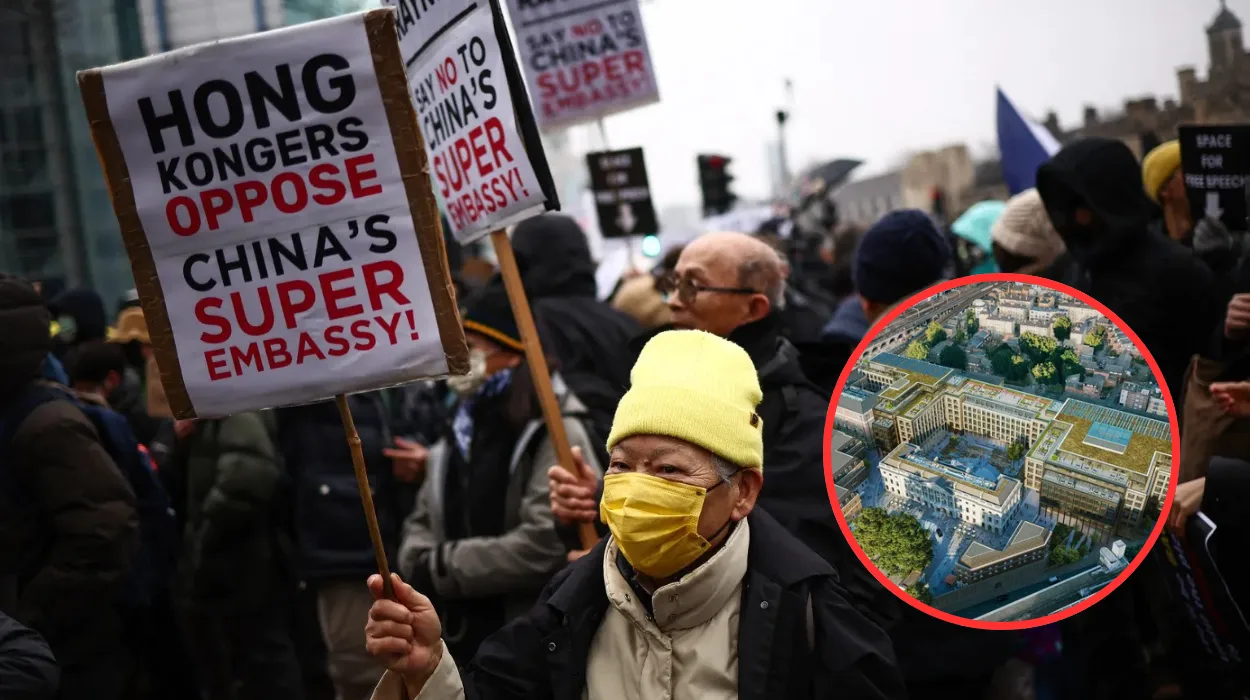Key Points
- Tower Hamlets Council withdraws objections to the Chinese “super-embassy” at Royal Mint Court, stating it is “no longer in a position to present evidence.”
- Metropolitan Police had initially opposed the project, citing security concerns, but withdrew its objection after reviewing a China-funded pedestrian comfort assessment.
- The Planning Inspectorate has launched a 12-day inquiry, and a final decision will be made by Deputy Prime Minister Angela Rayner.
- Local residents and human rights groups continue to protest against the embassy, citing security risks and disruption concerns.
- Royal Mint Court Residents Association argues that protests have already caused disruption, raising concerns about safety if the embassy is approved.
- Lawyer Simon Bell claims central Government may have influenced decisions, pointing to a shift in the Met Police’s stance.
- Legal representative for China argues there is “no basis” for refusal, stating embassies must be treated equally under planning laws.
Why did Tower Hamlets Council withdraw its opposition?
Tower Hamlets Council has conceded it can no longer argue against China’s proposed “super-embassy” at Royal Mint Court, significantly boosting the chances of the project’s approval. On the first day of a 12-day national inquiry, the council admitted that, following new security assessments, it could no longer present evidence to support its prior opposition.
The council had originally rejected the plans in December, largely on the grounds of security concerns raised by the Metropolitan Police. However, after Scotland Yard withdrew its objection last month, citing a pedestrian comfort assessment commissioned and funded by China, Tower Hamlets was left with no grounds to continue its opposition.
Morag Ellis KC, representing the council, told the inquiry that expert consultants had advised that protest activity around the site “can be adequately accommodated” without significant risks to pedestrians or traffic. As a result, she stated, it would have been “irresponsible” to continue challenging the project.
What are the security concerns around the embassy?
The proposed Chinese embassy, the largest in Europe, has drawn significant opposition from local residents, human rights groups, and several MPs, including Conservative Shadow Justice Secretary Robert Jenrick.
One of the key objections was that the site was unsuitable for large-scale protests, with concerns that demonstrators could spill into the road and block traffic. However, the Metropolitan Police, after reviewing the China-funded security report by Arup and Cundall, determined that the embassy site has sufficient space for such events.
Despite this reversal, residents argue the assessment fails to account for real-world scenarios. Lawyer Simon Bell, representing the Royal Mint Court Residents Association, stated that recent protests against the embassy already demonstrated “police failed to contain protesters” in designated areas, leading to blocked roads and heavy police presence.
Bell warned that if this level of disruption is occurring before the embassy is built, the impact would be even greater once the site is operational.
Do residents still oppose the embassy?
Yes, opposition remains strong among residents and activists, who fear the embassy’s presence will cause long-term disruption, security risks, and surveillance concerns.
Speaking at the inquiry, Simon Bell accused the Government of influencing decisions, claiming that the Met Police’s withdrawal of objections was politically motivated.
Bell argued that historic protest data relied upon by Scotland Yard does not accurately predict the future scale of demonstrations, especially given China’s human rights record and ongoing tensions over Hong Kong, Tibet, and Xinjiang.
“My clients have concerns that central Government, through the Home Office and Foreign Office, have sought to influence the approach to these applications,” he said, alleging a “political pre-determination” of the case.
What are the legal arguments in favour of the embassy?
Christopher Katkowski KC, representing the Chinese Embassy, stated that there is “literally no basis” on which the embassy could be refused planning permission.
He emphasised that planning laws require embassies to be treated “nation-neutral,” meaning that opposition based on anticipated protests cannot be grounds for refusal.
“An embassy proposed by one country must be treated the same as any other, regardless of whether one is likely to attract more protests,” Katkowski argued.
What happens next?
The Planning Inspectorate’s inquiry will continue over the next 12 days, gathering evidence from all parties before making a recommendation to Deputy Prime Minister Angela Rayner, who will have the final say on whether to approve the project.
While Tower Hamlets Council has effectively abandoned its opposition, the Royal Mint Court Residents Association and human rights groups remain determined to fight the plans.
With opposition still fierce and political tensions running high, the fate of China’s controversial “super-embassy”remains uncertain.



